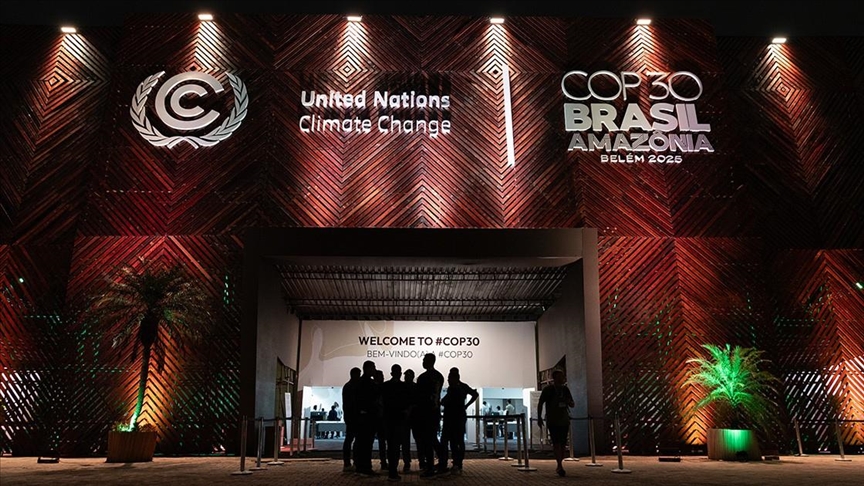EXPLAINER - COP30 deadlock: Why has the UN climate summit gone into overtime?
COP30, originally set to conclude on Friday, has run into overtime with negotiators deadlocked over fossil fuels and climate finance issues

ISTANBUL
The COP30 climate summit in Brazil, which was set to conclude on Friday, has gone past its scheduled deadline as negotiators remain deadlocked over urgent issues in global climate policy, including fossil fuels and climate finance.
In Belem, a city near the edge of the Amazon rainforest, environmental activists, diplomats, and negotiators have spent two weeks in intense discussions over greenhouse gas emissions, fossil fuels phaseout, climate change, and limiting global warming to 1.5 °C.
Yet by the end of Friday, no deal had been finalized, as talks stalled over the wording of the draft agreement and unresolved financial commitments.
Experts call the deadlock unsurprising.
“It is unsurprising that negotiations remain deadlocked, as the transition away from fossil fuels and shortfalls in climate finance, particularly for adaptation, have been consistent sticking points in recent years," Katherine Browne, a research fellow at the Stockholm Environment Institute, told Anadolu.
She stressed that fossil fuels are at the root of climate change, many countries remain reliant on them, "an economic reality which makes governments hesitant to make hard commitments to phase out."
Peter Dynes, managing director at Mirrors for Earth's Energy Rebalancing (MEER), said that the influence of lobbyists remains a major factor.
"Once again, fossil fuel lobbyists are among the largest and most influential groups at these gatherings, shaping outcomes to protect their own interests. The absence of any language on a fossil fuel phaseout is a direct reflection of that influence," Dynes said.
Fossil fuels remain core issue
Countries remain divided over the issue of fossil fuels, with the latest agreement from the Brazilian presidency making no mention of them and providing no roadmap for their phaseout.
For any agreement to be adopted, consensus among nearly 200 participating countries is vital.
However, media reports suggested that 30 countries supporting a phaseout of fossil fuels have threatened to block the deal unless a clear commitment is included.
The EU has rejected the draft, with its commissioner for Climate, Net Zero and Clean Growth, Wopke Hoekstra, saying they need to accelerate their commitment to implementation, keeping 1.5 °C alive not in speeches but in practice.
For Neil Robinson, a lecturer in Net Zero Engineering at Queen's University Belfast, a widespread agreement on a plan to phase out fossil fuels is a critical outcome of these talks.
"Emissions from fossil fuel use are by far the largest contributor to climate change – a statement with no reference to their phase out would be a really disappointing outcome, and could really stall progress."
Expert Dynes stressed Brazil's domestic policies with regard to the omission of fossil fuels in the draft text.
"Brazil’s President Lula, who is hosting COP30 in Belém, has had one of the world’s largest oil fields named after him — the Lula oil field, producing over 1 million barrels of oil per day. In recent months, his administration has also sided with the oil industry over environmental protection, backing Petrobras in pushing for drilling near the Amazon’s sensitive coastal region, despite strong warnings from experts and his own environment ministry."
Climate financing a major challenge
Last year in Baku, COP29 raised the annual climate finance target for developing nations from $100 billion to $300 billion.
While the new draft deal of this year's climate summit calls for global efforts to triple financing available to countries by 2030, it remains unclear how much funding will come from the public or the private sectors of wealthy nations.
Dynes highlights that financial support for the most vulnerable countries remains a "slow, inadequate drip-feed," with wealthy nations continuing to underdeliver on climate finance and turning their backs on the world.
Expert Browne agreed. "Though wealthy countries have made big promises of financial support to poorer and more vulnerable countries, they have struggled to follow through."
With the closed-door negotiations now continuing into the weekend, the outcome of COP30 remains uncertain.
"Climate negotiations are still being dictated by political expediency and fossil fuel power. Until we break that cycle and confront these contradictions head-on, progress will remain rhetorical while the planet continues to heat," Dynes said.
Anadolu Agency website contains only a portion of the news stories offered to subscribers in the AA News Broadcasting System (HAS), and in summarized form. Please contact us for subscription options.


